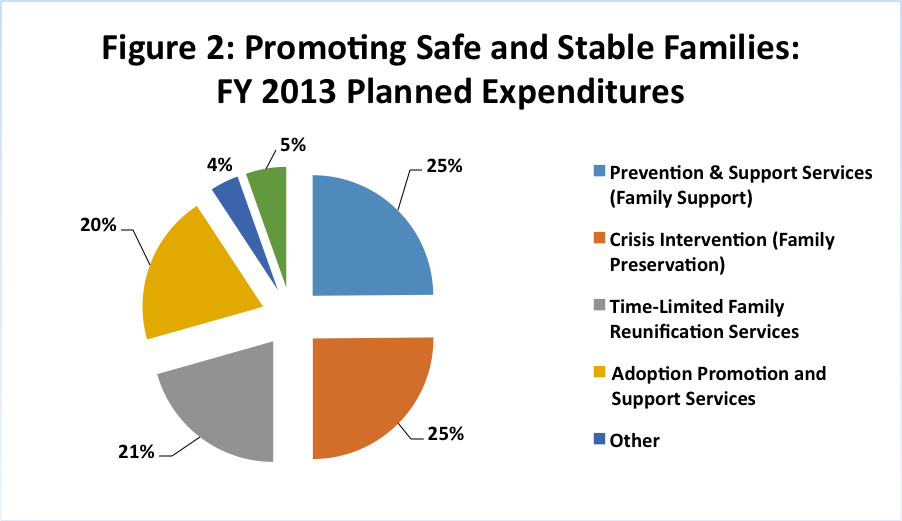Celebrating the 40th anniversary of IFPS includes celebrating several key federal programs that provide support for IFPS.
The first is the Family Preservation and Support Services Program enacted by Congress in 1993. This federal program was later changed to Promoting Safe and Stable Families (PSSF). The PSSF program was most recently reauthorized in 2011 for a period of five years. There are currently four categories of services that can be funded through PSSF:
- Family preservation services
- Family support services
- Time-limited family reunification services
- Adoption promotion and support services
For FY 2013 the total amount of funding was approximately $310.8 million. States are required to spend 20% for each of the four categories unless they provide a rationale for spending less. Administrative costs cannot exceed 10%. The following chart shows how states planned to allocate expenditures for the most recent fiscal year:
In addition to the four categories of funding, the PSSF program also provides funding to ensure that children in foster care are visited monthly by their caseworkers, grants to increase the well-being and permanency of children affected by substance abuse, and authorization for up to 10 new child welfare waiver demonstration projects per year (Title IV-E Waivers).
Federal child welfare waivers are important because they allow states more flexible use of federal funds to improve child welfare services. Funds that ordinarily would be used only for children in out-of-home placement can also be used for preventive services.
A Title IV-E Waiver is being used to expand IFPS (Homebuilders®) in Washington State. The centerpiece of Washington State’s demonstration project—implementing a differential response to allegations of child abuse or neglect—is intended to provide supports and services needed to keep children who are alleged to be abused or neglected safely in their own homes. One purpose of the project is to prevent and reduce out-of-home placements. The goals and purposes for differential response are closely tied to the expansion of IFPS.
According to the waiver application, past outcomes experienced by Washington State specific to Intensive Family Preservation Services using the Homebuilders® model include:
- Appropriate connection of families to community resources;
- Avoidance of new referrals to the department for Child Protective Services, Child and Family Welfare Services, or Family Response Services within one year of the most recent IFPS case closure by the department;
- Prevention of placement or achievement of placement stabilization or reunification in 95 percent of cases;
- Reduction in the length of stay in out-of-home placement, for reunification cases;
- Reduction in level of risk factors as indicated by North Carolina Family Assessment Scale;
- Prevention of reentry into out-of-home placement for over 75 percent of cases during the six months following termination of services.
The Washington State Department of Social and Health Services anticipates that expanding IFPS services by 10% will save $1 million during the five-year project.
The next time you contact your federal senator or congressional representatives, thank them for enacting PSSF and Title IV-E Waivers!
(Eileen West, ACF/Children’s Bureau, contributed information about the PSSF program.)
_______________
Posted by Priscilla Martens, Executive Director, National Family Preservation Network

